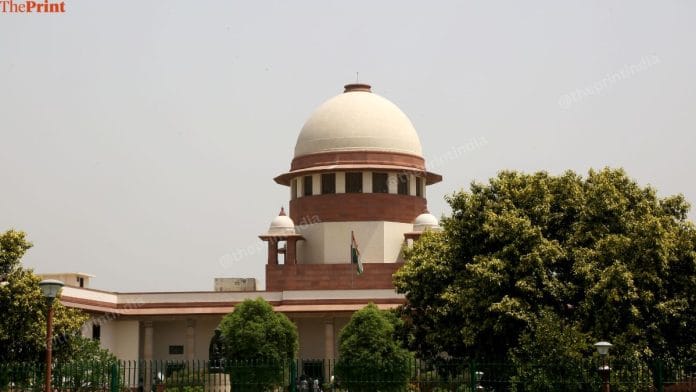New Delhi: The Supreme Court delivered a split verdict Wednesday while acting on an appeal filed by P. Nallammal, the wife of the late former Tamil Nadu labour minister A.M. Paramasivam, challenging her conviction in a disproportionate assets case.
Justice Sudhanshu Dhulia upheld the conviction by a trial court in 2001, saying the prosecution had established its case and it was subsequently upheld by the Madras High Court in 2023.
But Justice Ahsanuddin Amanullah disagreed, saying that “something more” was needed to establish abetment by Nallammal under Sections 107 and 109 of the Indian Penal Code (IPC), which relate to abetment and its punishment.
Now, all eyes are on the incoming Chief Justice of India, B.R. Gavai, who is slated to send the case before a larger bench.
A split verdict arises when a two-judge or division bench delivers contrasting verdicts, requiring the case to go to a three-judge or larger bench for consideration.
Paramasivam was an elected Member of the Tamil Nadu Legislative Assembly from 1991 to 1996. Having served as the state minister for labour welfare from 1993 to 1996, a case was later registered against him and his wife, alleging that they acquired properties worth Rs 38.72 lakh beyond their known financial or pecuniary resources while the late minister held public office.
What the law says
Under Section 107 of the IPC, a person is said to abet an act if they instigate it or conspire with two or more persons. Any act or illegal omission taken in pursuance of the conspiracy falls within the scope of abetment.
Apart from this, one who “intentionally” aids either through acts or illegal omissions will also be said to have abetted that act.
Simply put, this provision means that anyone who, by wilful misrepresentation or by wilful concealment of a material fact which he is bound to disclose, voluntarily causes or procures, or attempts to cause or procure, an act, is said to instigate the act.
Under Section 109, the punishment for abetting an offence is the same as the punishment for the original offence. For example, if someone abets a murderer in killing another person, by helping him get the murder weapon or other ingredients essential to the act, the person helping the murderer could face the same punishment as the one prescribed for murder, the provision says.
How does a public servant commit criminal misconduct?
Besides this, Section 13 (1) (e) and 13 (2) of the Prevention of Corruption Act, 1988, were invoked against Nallammal, which deal with the offence of a public servant committing criminal misconduct and the punishment for the same.
Under this provision, a public servant is said to have committed criminal misconduct in two ways.
The first is if he dishonestly or fraudulently misappropriates or otherwise converts for his own use any property entrusted to him or any property under his control as a public servant, or allows any other person to do so.
The second is if he intentionally enriches himself illicitly during the period of his office. The punishment for this entails four to nine years of imprisonment, with a fine.
The reasons given by each judge for his decision
Justice Dhulia sentenced the late minister’s wife to one year’s rigorous imprisonment in the disproportionate assets case.
“Though I agree with some of the observations made by my brother Judge, yet I am unable to accept the conclusion and findings of acquittal as regards Accused No.2, who was the wife of the public servant Accused No.1.”
Both judges fundamentally disagreed on the late minister’s wife’s conviction.
While Justice Amanullah said she should be acquitted as matters of life and liberty shouldn’t easily be trifled with, Justice Dhulia said that she should be imprisoned for the offence of abetment and criminal misconduct by a public servant.
Justice Dhulia said that although mere registration of disproportionate assets in the name of a public servant’s relative or friend will not make that person guilty of abetting the offence, “it is also a settled position of law that a person who is not a public servant still can commit an offence under Section 13(1)(e) and Section 13(2) of the PC Act read with Section 109 of the IPC”.
Saying that the wife became an “accomplice” in committing the crime when she allowed the late minister to register the properties in her name, Justice Dhulia said, “Where there is abetment by a close relative in corruption matters, such as the spouse in the present case, the culpability of such a relative has to be tested by the surrounding circumstances and his/her overall conduct.”
The court also said that it found it impossible to believe that the wife had no idea of the late minister amassing assets and properties “hugely disproportionate” to his known or legitimate sources of income.
“It is very hard to believe that she was not aware that these assets which were in her name were not acquired from her husband’s legitimate sources of income,” the court said.
On the other hand, Justice Amanullah said it was unsafe to uphold her conviction as there was “absolutely no evidence on record, much less any evidence” to prove beyond a reasonable doubt that the wife conspired, colluded or intentionally aided her husband in committing the offence under the 1988 Act.
The judge also added that the sole or solitary circumstance of name-lending cannot lead one to infer that the wife was guilty.
“There has to be something more in the form of positive evidence to satisfy the essential requirements for the offence of abetment. Life and liberty are not things to be trifled with on the basis of conjectures and surmises,” Justice Amanullah said while acquitting the late minister’s wife.
(Edited by Sugita Katyal)
Also read: India’s courts place conditions on women’s rights—can’t drink, trust men, get married






